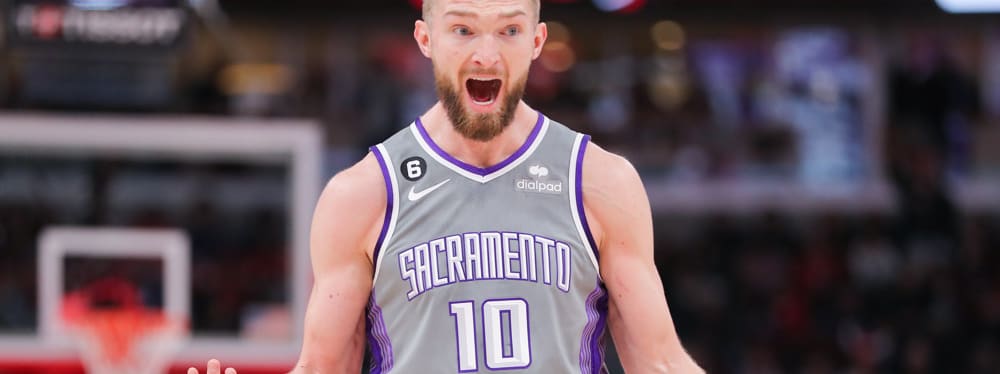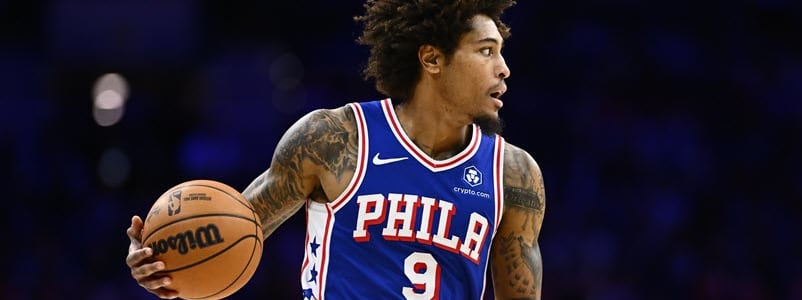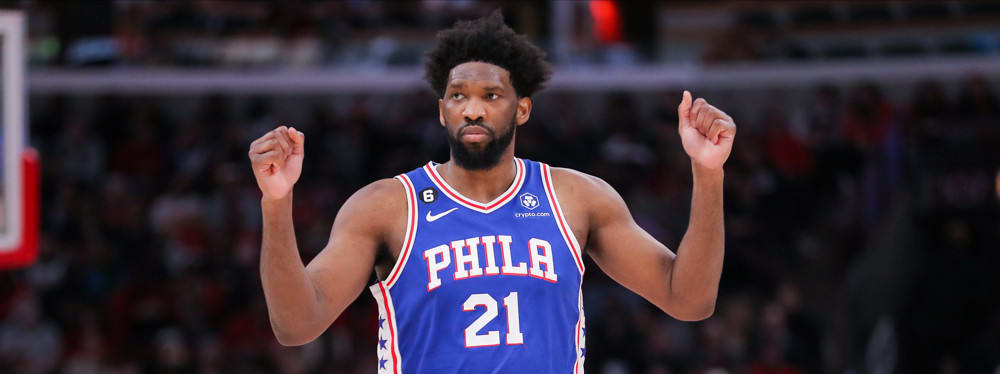Recent RotoWire Articles Featuring Marcus Morris
See More
Morris has established himself as a solid role player, but that's all he is in Los Angeles. This team is dominated by Paul George, Kawhi Leonard and Russell Westbrook, with Morris playing an ancillary role to those superstars. It led to one of the worst seasons of his career in 2022-23, with Morris averaging 11.2 points, 4.0 rebounds, 1.8 assists, 0.6 steals and 1.7 threes across 28 minutes a night. He averaged 14.4 points and 5.0 rebounds across 30 minutes a night in the previous seven seasons, and it's unclear if Morris can return to that type of player. The depth of this roster is the major issue because we didn't even mention Kenyon Martin, Nicolas Batum, Norman Powell and Robert Covington. Ivica Zubac and Mason Plumlee have the center position locked up as well, and it means that Morris won't play more than 25-30 minutes for this stacked roster. He's always worth keeping an eye on as a stretch-four, but his limited minutes are capped by how deep this rotation can be.
Morris took on a marginally bigger role last season with Kawhi Leonard out for the entire year. His usage rate increased from 20.1 percent to 23.2 percent, and he saw increases in points (15.4), rebounds (4.4), assists (2.1) and minutes (29.0) compared to 2020-21. However, his efficiency from the field (43.4%) and three (36.7%) decreased from the previous year. Ultimately, the result was a similar fantasy value, with Morris ranking 150th in per-game eight-category production. This season, Morris will have to fight more for touches. Leonard enters the season healthy, and the Clippers have quickly turned into one of the deepest teams in the NBA. Norman Powell and Robert Covington were added at last year's trade deadline, and John Wall was picked up over the summer. Nicolas Batum, Amir Coffey, Terance Mann and Luke Kennard are also in the fold. Morris should still regularly see minutes in the 20s, but he will probably have trouble being fantasy-relevant in standard leagues.
Last year marked Morris' first full season with the Clippers after being traded there from the Knicks in 2019-20. Morris played a sixth-man role, starting 29 of his 57 appearances and averaging 13.4 points, 4.1 rebounds and 1.0 assists in 26.4 minutes. He also shot an impressive 47/47/82. The result was the veteran ranking 156th in fantasy on a per-game basis -- quite the dip from his 2019-20 mark of 95th, though that wasn't unexpected. That said, Morris should have a better campaign in 2021-22. Kawhi Leonard (knee) could be out the whole season, which would make Morris a legitimate starter at forward with potential to see 30 minutes per game in addition to increased usage. In fact, with Leonard off the court last season, Morris averaged 20.5 points, 5.6 rebounds, 1.5 assists and 1.1 steals per 36 minutes. That level of scoring probably won't be reached, but it seems fair to expect Morris to be on the positive side of 15 points per game. The forward's upside is still relatively low given his recent production and team context, but fantasy managers in deep leagues have plenty of reason to take Morris with a final draft pick.
Morris spent the early portion of last season with the Knicks, where he was putting together a career year with averages of 19.6 points, 5.4 rebounds and 1.4 assists in 32.3 minutes. At the trade deadline, however, he was moved to the Clippers. There, he saw his role reduced, averaging 10.1 points, 4.1 rebounds and 1.4 assists in 28.9 minutes. Even with his numbers dipping late in the year, Morris had the best fantasy season of his career on a per-game basis, ranking 95th in eight-category leagues. During the offseason, Morris re-signed with the Clippers on a four-year, $64 million contract, meaning his role should be secure. While that's a lot to pay for someone who averaged barely double-digit points in both the regular season and playoffs, he shot 51/48/93 during the postseason. From a fantasy perspective, he's a fair choice outside of the top 100.
He might not have received a lot of headlines, but Morris was a key part of the Celtics' rotation last season. Although he didn't provide many defensive stats, he averaged 13.9 points, 6.1 rebounds and 1.9 three-pointers across 28 minutes a game. He was excellent from the charity stripe, converting 84.4 percent of his attempts. With the Celtics choosing to move on, Morris now finds himself as a member of the Knicks. This isn't exactly an ideal situation with the likes of Kevin Knox, Wayne Ellington, Julius Randle, Bobby Portis and Taj Gibson all competing with him for playing time at the two forward spots. The Knicks also had one of the most inconsistent rotations in the league last year, so Morris' playing time could fluctuate dramatically. Barring injuries to some of his teammates, it's difficult to envision a path for Morris carving out significant fantasy value. If anything, this might be the season to only consider selecting him in deeper leagues.
Last year’s arrival of Morris was met with mixed reviews in Boston, given that it meant parting ways with Avery Bradley. But Morris was an ideal complement to fellow-bigs Al Horford and Aron Baynes, allowing Stevens to mix and match lineups based on opponent weaknesses. Fantasy-wise, leaving Detroit’s thin roster meant a slight dip in minutes for Morris. But the reduced playing time also led to better shooting percentages, including a 37 percent success rate from behind the arc. The return of a healthy Gordon Hayward means Morris will almost certainly shift to the bench, and his production is likely to suffer, as a result. Morris can still be a factor in deeper leagues, but his contributions in points and rebounds may not be significant enough to warrant high ownership in some standard formats.
Last year in Detroit, Morris was a starter in each of the 79 games in which he appeared. That's unlikely to happen this year in Boston. This summer, the Celtics acquired Morris in exchange for Avery Bradley as Boston cleared salary space for free agent star Gordon Hayward. The good news for Morris is that Boston is in desperate need of size and rebounding. The bad news is that Morris averaged a paltry 4.6 rebounds per game last year despite playing a high 33 minutes per game. The Celtics need rebounding, but are unlikely to get it from Morris. Coach Brad Stevens is happy to go with a small ball, positionless basketball approach that will probably lead to rookie Jayson Tatum seeing minutes at power forward. On the positive, the three-for-one deal that brought Kyrie Irving to Boston should free up minutes for Morris. Last year, Morris attempted 4.5 three-point attempts per game, but only shot 33 percent from behind the arc. In fact, Morris’ three point shooting has gotten progressively worse since the 38% he shot in 2013-14. Boston loves to shoot threes, so expect Stevens to encourage Morris to keep hoisting treys. But if Morris’ minutes decline, he’ll be hard pressed to continue his two-year trend of 14.0 points per game. Stevens will most likely experiment with lineups throughout the first half of the season. Morris’ role may not be defined until after the All-Star break.
Though he expressed frustration last summer when he was traded away from the Suns (and brother Markieff) after he had agreed to a contract extension with Phoenix less than a year earlier, Morris quickly put any dissatisfaction of landing with the Pistons aside and embraced a full-time starting role for the first time in his career. Along with starting all 80 games in which he played, Morris benefited greatly from the Pistons' lack of depth on the wing, as coach Stan Van Gundy handed him 35.7 minutes per game, good for 10th-most in the NBA and a jump of 10 minutes per game from what he received in 2014-15. Morris used the uptick in playing time to post several career highs, with the 27-year-old averaging 14.1 points (on 43.4% shooting), 5.1 rebounds, 2.5 assists, 1.4 three-pointers and 0.8 steals per game. Morris is at his best as a mid-range shooter, but his improved proficiency from long range over the last two seasons (36%) has helped upgrade his fantasy outlook. Van Gundy indicated he planned on finding more run for his wing reserves in 2016-17, but Morris seems like a safe bet to continue receiving 30-plus minutes per night. His ability to move between both forward spots and chip in across a few different categories makes him quality roster filler in most fantasy leagues.
Marcus and his twin Markieff Morris signed joint four-year extensions with the Suns last season, expecting to play together for the long haul, but in the Suns' attempt to sign LaMarcus Aldridge this summer, they sent Marcus to the Pistons in what was essentially just a salsry dump to clear cap space. The Pistons, on the other hand, were thrilled to receive Marcus Morris in a trade that allowed them to simply absorb his contract into their cap space. Marcus is the projected starter at small forward, but after rookie Stanley Johnson went buckwild at the Orland Summer League, Morris might get pushed to the bench. It's also possible that even more lineup shuffling could happen, and the Pistons could decide to start Morris and Johnson at the forward spots by pushing presumed starting power forward Ersan Ilyasova to a bench role. Through 81 games with the Suns last season, Morris averaged 10.4 points, 1.4 three-pointers, 4.8 rebounds, 1.6 assists, 0.8 steals, and 0.2 blocks in 25 minutes per game while shooting 43 percent from the field, 36 percent from three, and 63 percent from the line. He doesn't take many shots from the line, which is probably why he's so erratic there despite being a capable three-point shooter. Morris was a much better shooter off the bench last season (39% 3Pt), playing against other second-string players, than he was in 35 games as a starter (32% 3Pt), and he's been a streaky player throughout his career, so don't be surprised if he gets slotted into a bench role this season and ends up playing a 3-and-D role behind Johnson and Ilysaova at the two forward spots. Morris is intriguing this season, but most players are what they are, and he has been a bench player for the majority of his career, so it's kind of hard to see him growing into much more than that unless he becomes more consistent this season.
One half of the Morris duo enters his fourth season in the NBA and second full season in Phoenix. In 2013-14, Morris averaged 9.7 points, 3.9 rebounds, 1.1 assists, and 0.9 steals in 22 minutes per game. He shot 44 percent from the field on 7.9 attempts, 38 percent from three on 3.2 attempts, and 76 percent from the free-throw line on 1.9 attempts per game. While not a major fantasy factor, Morris certainly carved out a nice role with the Suns last season and contributed to the team's success in the difficult Western Conference. On the fantasy side of things, he doesn't offer much value outside of his ability to hit three-pointers as a power forward. Given Channing Frye's departure, Morris will have a chance to fill his stretch-four role, though he has competition from his brother Markieff Morris and Anthony Tolliver, and Marcus is a bit undersized for the task. As is, Morris is only a faint blip on the fantasy radar in most formats.
Life in Phoenix did not treat Morris kindly. Coming over in a mid-February trade from Houston, he was not granted consistent playing time. When he was on the floor, the former Jayhawk shot the ball poorly. He averaged 7.7 points in 20 minutes last year and made 56 percent from the stripe. Morris must outperform his brother from long range to find minutes.
Last year's first-rounder, Morris didn't make a significant impact, as Parsons beat him out for minutes at the three, and Morris probably doesn't project as a regular four. This year, Morris will have to hold off Royce White and Terrence Jones even to secure a backup role.
The 14th overall pick in this year's draft, Morris is a capable scorer with a fluid jump shot who could contribute at the NBA level out of the gate - at least on the offensive end. Morris needs to add more strength and improve his defense to get consistent minutes, however. For now, we'd expect Chase Budinger to see most of the team's minutes at the three, but Budinger's hardly an established player, so the door is open for Morris to get more run.













